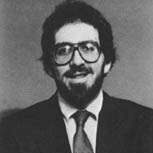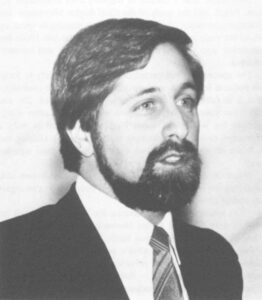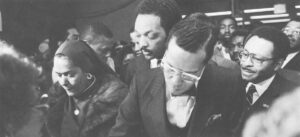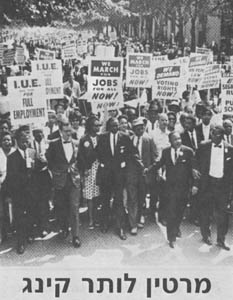Jonathan Kaufman
- 1986

Fellowship Title:
- The broken alliance between Blacks and Jews in America
Fellowship Year:
- 1986

Too Young to Have Marched with King
Just a few months out of college, Donna Brazile had one of the best jobs in America. She would be coordinating the 20th anniversary of the 1963 March on Washington–the march that had ended with Martin Luther King’s ringing “I Have a Dream Speech” and marked another step in the road leading to passage of the Civil Rights Act of 1964. Like many of the seminal events of the Civil Rights Movement, the March had been a triumph of coalitions. It included Jews, union members, clergy, thousands of liberal whites. Brazile had been three years old when the first march took place and had always regretted missing out on the excitement of the 1960s–the excitement her parents and grandmother in Louisiana often talked about, of freedom rides and sit-ins. For someone thirsty for history, organizing the 20th anniversary march was a chance to work with some of the most famous names of the past two decades: Bayard Rustin, Andrew Young, Jesse Jackson, Coretta Scott King. But it soon became apparent that a great deal had
The Transformation of Marionette Manor
CHICAGO–it was wretchedly hot that July Sunday in 1966. The temperature soared to 98 degrees. More than a half million people jammed the beaches. But along State Street and the Outer Drive, Roz and Bernie Ebstein marched slowly towards Soldier’s Field, carrying a banner from the American Jewish Congress, demonstrating with Martin Luther King, Jr. Civil Rights leaders had dubbed the day “Freedom Sunday” in anticipation of a giant march and rally to protest housing and employment discrimination in Chicago. The brutal heat combined with a cooling ardor towards the Civil Rights Movement kept the turnout far below expectations–30,000 people, less than one-third of the 100,000 King and his organizers had hoped for. The Ebsteins had come to the rally from their small wood and brick duplex house in Marionette Manor, in Chicago’s Far South Side, a white, middle class neighborhood about 40 percent Catholic, 40 percent Jewish, and 20 percent Protestant that had seen its first black family move in the previous year. The Ebsteins were determined their neighborhood was going to be a

Journey to Israel
JERUSALEM–The jogging path from the hotel ran past a street named in honor of Rev. Martin Luther King Jr. A month earlier, in January, the Israeli Parliament had held a special session commemorating King’s birthday. Leaflets had been distributed to all the schools describing, in Hebrew, the bus boycott in Birmingham in 1956, the March on Washington with its famous “I Have a Dream” speech, the 50-mile voting rights march from Selma to Montgomery in 1965 with King walking arm in arm with Rabbi Abraham Joshua Heschel, King’s assassination in Memphis. Israeli commentators quoted a speech given by King ten days before his assassination in 1968. “1 see Israel, and never mind saying it, as one of the great outposts of democracy in the world, and a marvelous example of what can be done, how desert land almost can be transformed into an oasis of brotherhood and democracy. Peace for Israel means security and that security must be a reality.” Here in Israel this past winter, it was possible to recall an earlier age, the

A Broken Alliance
The United States Army was still segregated in April, 1945. Blacks fought in separate companies commanded by separate officers. As the war neared an end, allied troops pushed east to Berlin and south toward Austria. General Dwight D. Eisenhower wanted to wrap up the war by June. Paul Parks, a 20-year old sergeant from the poor, black part of Indianapolis was settling down for the night on the outskirts of Munich when he received word that the next morning he and his troops would be the advance soldiers into a camp called Dachau. Parks assumed “Dachau” was a German army camp. He wondered why his unit was to be first in. They were support soldiers, in charge of building bridges and defusing mines, not combat troops. Parks had known a handful of Jews before going overseas. There was Gabe Segal, who owned the grocery store in his neighborhood, who had taken him aside once to explain the Star of David and the Hanukah menorah. There were the Jews who lived with him in college, at
